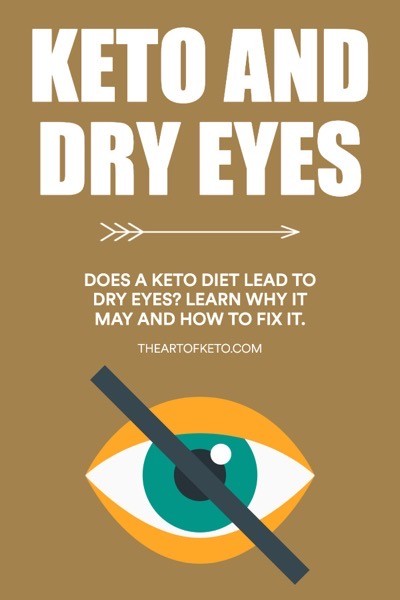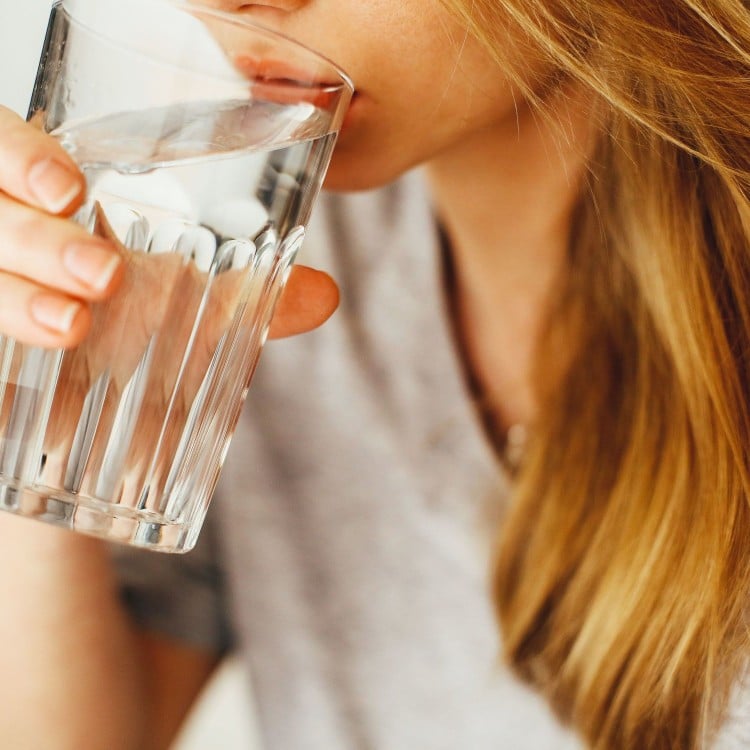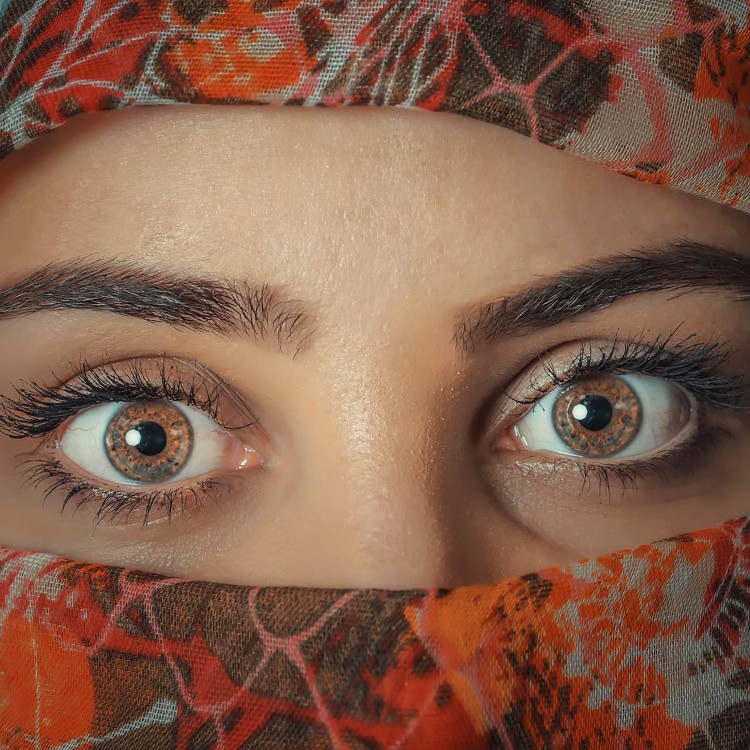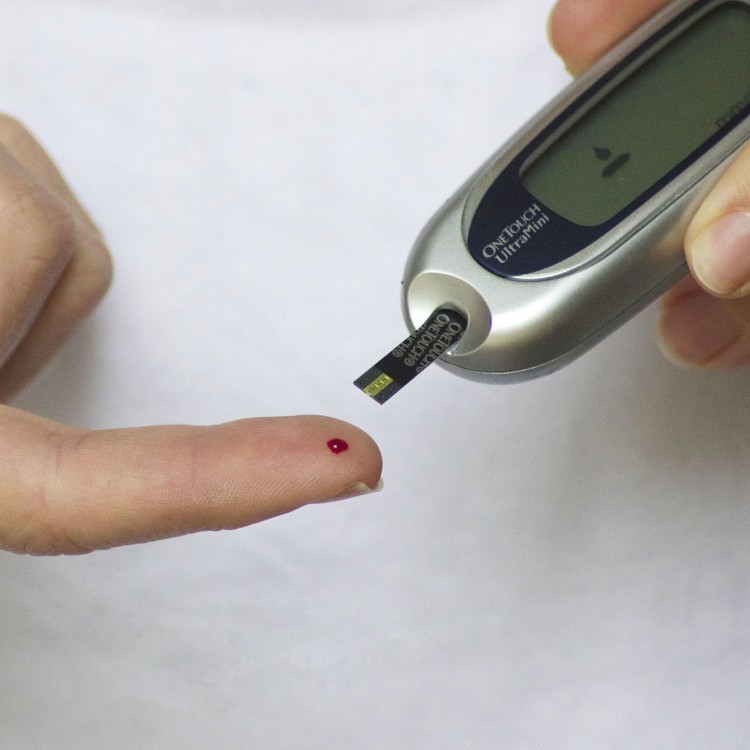After starting a ketogenic diet, your body is going through so many changes. Many of those changes are related to a shift in electrolytes, and as a result, hydration. This may lead people to experience increased sweating, dry lips, and even dry eyes.
A low carb or keto doesn’t directly cause dry eyes. Still, a ketogenic diet may leave people mildly dehydrated or deficient in vitamin A, two possible causes for dry eyes while eating a keto diet. Increasing foods in eye-healthy nutrients and electrolytes may help alleviate these symptoms.
In this article, I’ll go over why a ketogenic diet may cause dry eye, other reasons why you may be experiencing dry eye, and ways to fix or alleviate it.

Does Keto Cause Dry Eye?
A ketogenic doesn’t directly cause dry eyes by any means of being in a state of ketosis. However, many people suffer from mild dehydration or deficiencies in specific vitamins when first transitioning to a ketogenic diet.
Mild dehydration

Many people suffer from mild dehydration due to water loss after transitioning to a ketogenic diet.
When you switched to a ketogenic diet, you may have noticed a substantial drop in the scale. While losing a good amount of weight at the start of a diet is very motivating, a large portion of the weight was water and glycogen (stored carbohydrates).
Don’t get me wrong, some of the weight you lost was fat, but if you happened to notice the need to pee more on keto during the first week, you weren’t imagining. LINK
Once carbohydrates are restricted on a ketogenic diet, water previously-stored is released from the body as glycogen is burned.
Glycogen is just fancy way of saying stored carbohydrates, which is stored in your liver and your muscles.
For every gram of glycogen your body stores, an additional three grams of water is stored with it.On average, your body will store ~500 grams of carbohydrates, which, if you do the math, equates to ~1,500 grams of water. After carbohydrates are restricted, your body begins to burn through this stored glycogen to fuel your muscles, other bodily functions, and especially your brain.
As a result, your body begins to expel this water anyway it can (breath, urine, sweat, etc.). Along with the water, vital electrolytes, such as sodium and potassium are excreted, and you’re often left mildly dehydrates and with an electrolyte imbalance.
This massive shift in water and electrolytes leads people to experience signs and symptoms of the influenza flu, referred to as the keto flu. If you’re experiencing more side effects than just dry eyes, you may want to pay attention to what I’m about to tell you.
To help combat possible related keto-dry eye, and even keto flu symptoms, make sure you are drinking a sufficient amount of water and replacing lost electrolytes.
You can easily make sure you’re hydrated by making sure you are drinking plenty of water to thirst and salting your foods liberally to taste.
Read: How Much Water To Drink On Keto
A simple way to gauge your level of hydration is by the color and smell of your urine. You want your urine to be a pale yellow and nearly odorless.
Vitamin A deficiency

Maybe bugs bunny, and your mom was right in telling you to eat your carrots. Vitamin A helps promote healthy eyes, and a deficiency in vitamin A may lead to dry eyes and other vision impairments.
In worse cases, deficiency in Vitamin A may lead to permanent eye damage and even blindness.The good news is, more than 75% of people who eat a standard American diet consume enough Vitamin A. The bad news is, you’re not eating a standard American diet.
If you’re doing lazy keto and not eating whole-unprocessed foods, you may be deficient in this vital nutrient.
Some keto-friendly foods that are rich in vitamin A include:
- Darky leafy greens (Spinach, Kale, Swiss chard)
- Animal Liver
- Seafood (King Mackerel, Salmon, Bluefin Tuna, Trout)
- Eggs
- Cheeses (Goat, Cheddar, Blue, Feta, Paneer)
- Nopales cactus and prickly pear
I should also differentiate, there are two forms of vitamin A, preformed vitamin A, and pro-vitamin A.
Preformed vitamin A is found in animal products and is better absorbed. Pro-vitamin A is found in plant-based foods and must be converted for absorption.
Pro-vitamin A, the form found in plant-based foods, must be converted from carotenoids, the most common one being beta-carotene. However, about 45% of people carry a genetic mutation that reduces their ability to convert pro-vitamin A into usable vitamin A.12
How Keto May Be Good For Your Eyes
While there isn’t any long-term research that looks into how keto impacts eye health, there are some interesting findings. For example, there’s a study that shows a positive impact on glaucoma in mice fed a ketogenic diet.3
Glaucoma is a disease that damages the eye’s optic nerve and leads to progressive vision loss. Glaucoma is also the second leading cause of blindness behind cataracts.
Anecdotally some people experience better vision after starting keto, though no research currently supports this.

Other Causes Of Dry Eye Not Necessary Related To Keto
Here are a few common causes of dry eye not related to keto. Try to see if any of these common causes may apply to you.
Aging
Tear production declines with age, especially if you’re over the age of 50 years old. While this isn’t controllable with any drugs (prescription or over the counter), your best bet is to use artificial tears regularly to provide extra lubrication and relieve the dryness.
Computer or screen use
We live in a modern society filled with screens, especially at work on a computer, or at home watching television or staring at your phone. When we stare at screens, especially at work, we tend to blink less often.
Every time you blink, your eyelids spread oils and mucous across your eye to keep them lubricated. Try to be mindful and make sure you blink periodically or give your eyes a break from the screen every so often.
Allergies and their medications
You may be thinking that allergies don’t give you dry eyes, they do the exact opposite, and you would be correct. However, the oral antihistamines you may be used to treat the allergies can make the symptoms of dry eye worse.
Try looking into antihistamine eye drops if you experience dry eyes from allergies.
Low humidity
If you live or work in an environment with low humidity, or maybe you sleep or work next to an air vent or fan, making sure the air doesn’t blow directly in your eyes may improve symptoms. You may also want to try looking into a humidifier to moisten the air if switching to a different area is out of the question.
Diabetes and other diseases

People with diseases such as diabetes, arthritis, and lupus are also susceptible to inadequate tear production, which may lead to dry eye.
Due to the lower carbohydrate nature of a ketogenic diet, many people with type 2 diabetes give ketogenic diets a shot with great success.
The Takeaway
A ketogenic diet is typically rich in fats, particularly healthy omega-3 fats, which may help prevent dry eyes and possibly cataracts.
When starting a ketogenic diet, you may experience a considerable loss in water, which may leave you mildly dehydrated, and lead to dry eyes. Additionally, making sure you’re eating animal and plant sources rich in vitamin A to help prevent a deficiency can also help.
So does keto cause dry eyes? Not necessarily, but make sure you’re well-hydrated is an excellent place to start.
Frequently Asked Questions
What should I avoid if I have dry eyes?
There are a few foods that are essential to avoid if you have dry eyes. The main foods that you should avoid are spicy and salty foods. Additionally, it's a good idea to avoid areas that have smoke, high winds, and air conditioning.
What foods are bad for dry eyes?
When dealing with dry eyes, it's a good idea to stay away from alcoholic beverages, foods that have a lot of spice, and foods that contain a high amount of sodium.
Can lack of protein cause dry eyes?
Yes! A lack of protein can be a quite common factor when it comes to causing dry eyes. It's a good idea to maintain a high level of protein consumption while on the keto diet.
